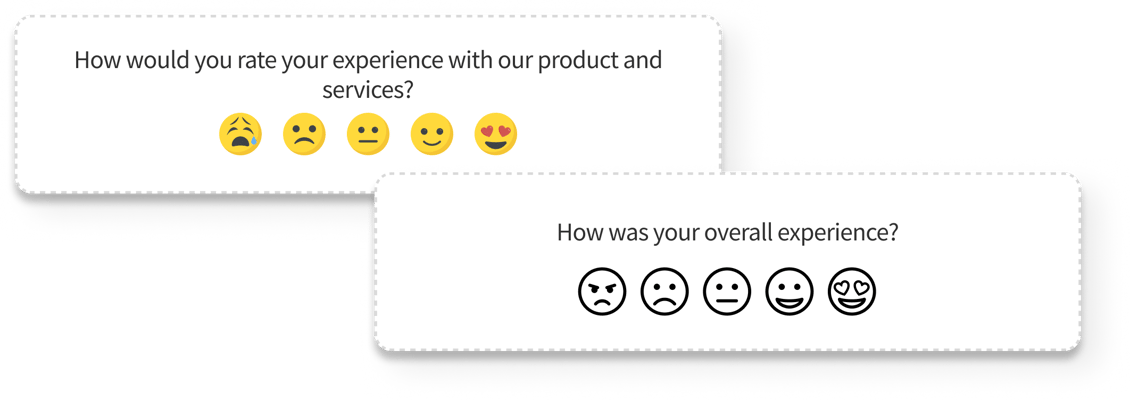Smiley face surveys or emoji surveys are a type of customer feedback method that uses emoticons and emojis to capture customer satisfaction.
Despite their simplicity and having the merit of being universally understood, smiley face surveys can provide valuable insights into customer sentiment. They can help you identify areas where you are excelling and areas where you need to improve. They can also be used to track customer satisfaction over time.
In this article, we talk about smiley face surveys, the smiley face survey question, how smiley face surveys work, the benefits of using them, and some real-life examples to draw inspiration from.
TL;DR
-
Smiley face scale, a type of customer feedback survey, helps gain insights into the customers' happiness level by letting them instinctively select the emoji that represents their feelings with facial expressions — a very happy face, happy face, a neutral face, a sad face or a frown and collect feedback.
-
They’re universally accepted and understood, which makes them a popular choice for customer satisfaction surveys and removes any language barriers in surveys. They’re easy to understand and engaging, and hence likely to get you a better survey response rate.
-
You can use the smiley face survey to measure product feedback, website feedback, customer satisfaction, customer service feedback, and even employee feedback. They work great at retail stores, airports, e-commerce, in-app feedback, and more.
-
When used effectively to collect customer emotions, these surveys can bring you insights to close the feedback loop and identify trends to make business decisions.
Create & send smiley face surveys😁😡
Start measuring customer sentiment effortlessly with emoji surveys on Zonka Feedback today!
What is a Smiley Face Survey?
Smiley face surveys are a popular way to capture feedback with emoji faces as answer options. Customers and users can choose from a varying range of emoticons, like happy face, neutral face, and frowny face emojis to express their feelings and feedback.
Studies suggest that around 92% of people on online channels use emojis daily. They’re a universal language and due to their wide acceptance and visual appeal, the smiley face survey or emoji survey is a great choice for measuring customer satisfaction and getting quick feedback.
Why use Smiley Face Surveys to measure Customer Feedback: Reasons & Benefits
They look good, of course! But that’s not the only reason to use smileys surveys. There are many advantages of using these for customer satisfaction. Let’s take a look at some of those.
-
They’re engaging: Unlike other survey scales, surveys with emojis are quite interesting and hence are likely to engage customers when used to collect feedback, leading to a better response rate.
-
They are universally understood: Emojis and emoticons are universally understood and accepted. People from all walks of life and of all ages, including children and adults recognize and identify with smiley faces.
-
They reduce all language barriers: Unlike written answer options, emojis are self-explanatory, and using them in surveys ensures that your customers, no matter which language they speak, can effectively communicate how they feel and their experience. Highly recommended to use them in multilingual surveys.
-
They help you measure customer satisfaction and collect feedback: They’re one of the easiest ways to measure customer experience and satisfaction since they relate directly to emotions.
-
They’re quick: Instead of having to read through lengthy questions and responses, customers can simply click on an emoji that best represents their feelings. This not only saves time but also makes the survey-taking process more engaging and enjoyable.
-
They lead to more accurate, honest, and quick feedback: Owing to the simplicity and clarity of a smiley face rating scale, they are proven to derive more accurate data with honest feedback from customers. Customers can be hesitant or reluctant to share negative feedback in words. However, when presented with the opportunity to select their experience through an array of emojis and emoticons, they can simply click on one that resonates with their experience, thus sharing their real feelings and more accurate feedback.
-
They help improve satisfaction and loyalty: When you use a feedback tool with a smiley rating, you receive more feedback with higher accuracy. This helps get you are in a better position to work on it and improve your experience. When you take the right actions to improve the experience, it enhances satisfaction. Also, it creates more loyalty among your customers as their feedback is getting heard and worked upon.
When to use Smiley Surveys?
They’re versatile and can be used anytime for gathering feedback. But there are four popular times when using these surveys is ideal.
- Throughout Journey
From the start of a person's interaction with your business, you can start measuring customer sentiment and experience. As the journey continues, there are several stages and touchpoints where you can use smiley surveys to collect feedback and measure customer experience at every touchpoint separately. This helps you know your strengths and weaknesses, and identify the areas where you need to improve your business.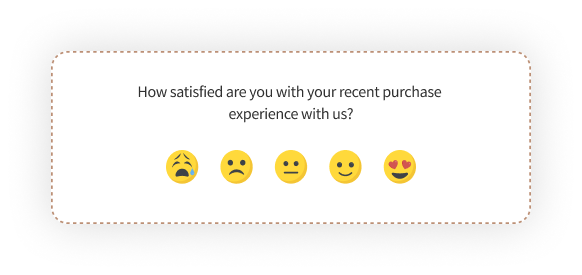
- Post-interaction or Transaction
Measuring satisfaction after an interaction or transaction is ideal to get instant feedback and improve the processes. For instance, you can trigger smiley surveys at touchpoints like just after placing an order, after a chat conversation ends, just after a meeting, after a demo, after a bill payment, issue resolution, and so on.
- At specific Events
You can measure feedback at specific events like when a user visits for the first time, tries a new feature, signs up, reads an article or blog, fills out a form and so on. For instance, if you introduce a new product variety or a product feature, as the customers use it, you can trigger an in-product survey as a slide-up survey with emojis to ask about their experience with the new feature or product.
- As follow-ups (after resolution or customer service)
Customer service, problem-solving, a query or issue resolution are crucial areas where customer experience is built and affected. Post-resolution customer service feedback using smiley faces works great to collect customer feedback, gain valuable insights into your customer service process and staff performance, and help to improve your process and thus build stronger customer relationships.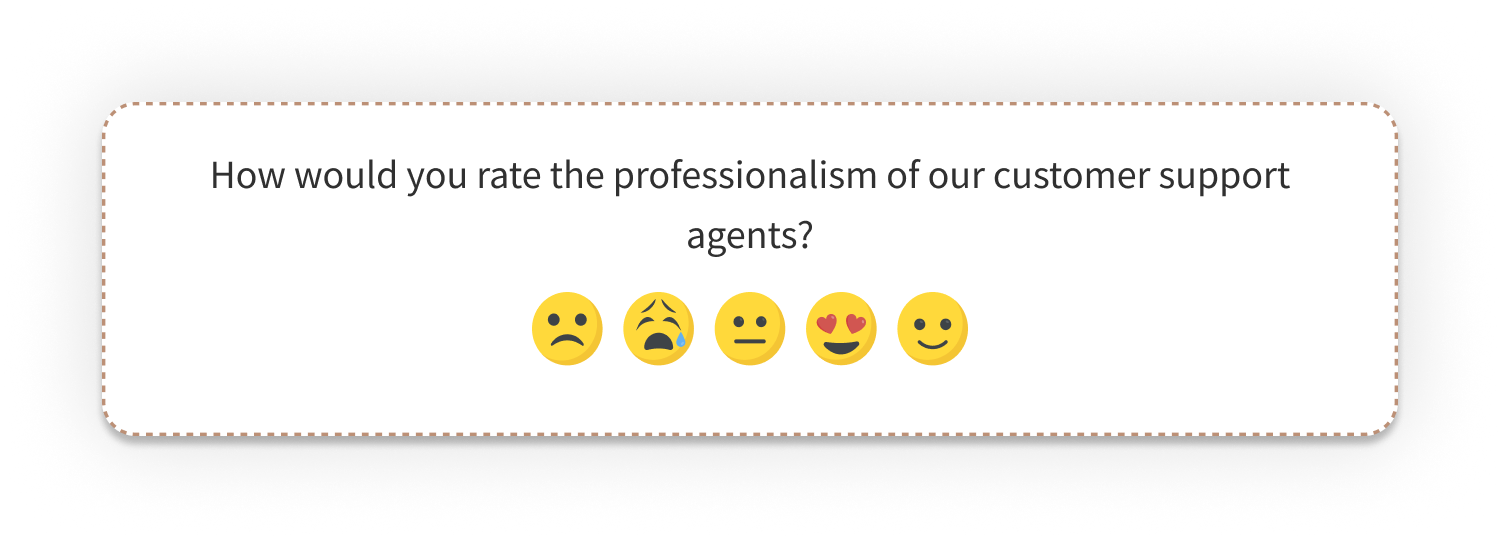 For instance, a customer raised a complaint about a product feature not working properly, and your customer service agents raised a ticker, took the issue and resolved it. Just after the issue is resolved, you can trigger a smiley survey to collect feedback about the service agents how they supported the customer, and the overall process of raising a complaint and issue resolution.
For instance, a customer raised a complaint about a product feature not working properly, and your customer service agents raised a ticker, took the issue and resolved it. Just after the issue is resolved, you can trigger a smiley survey to collect feedback about the service agents how they supported the customer, and the overall process of raising a complaint and issue resolution.
💡 While using emojis to get real time feedback and measure and improve customer satisfaction is highly recommended, we suggest not to send them very often else they may lead to survey fatigue.
Use Cases of Smiley Survey - Examples and Application
Measuring satisfaction is applicable almost everywhere. After you dine in at a restaurant, after you buy a product at a store, after you take a spa treatment or at your gym, at the airport or after your flight, after a stay at a hotel and the list goes on. And with the versatility of these surveys, they can be implemented in all these cases and more to get actionable feedback.
Here are some industry specific use cases and examples of smiley surveys along with a cheat sheet of questions you can use and templates to get you started.
1) Measuring General Customer Satisfaction
Using emoji surveys can add a touch of fun and engagement to your feedback collection process. With a sentiment analysis tool alongside this, one can understand the true emotions of customers, key drivers, intent, and much more. You can use smiley surveys to measure both customer and employee satisfaction and can deploy them after key customer interactions or internal employee meetings to gauge sentiment and identify trends in satisfaction across various departments or touchpoints.

Here are some examples of questions you can ask while measuring satisfaction using emoji surveys:
-
How would you rate your satisfaction?
-
How would you rate your satisfaction with [experience/service]?
-
How was your experience today?
2) Measuring Patient Experience
For the healthcare industry, factors like understanding the needs of patients, measuring patient satisfaction, and refining the quality of care can lead to improved patient experience. In order to measure all these indicators, a simple smiley survey question can do wonders.
Whether your aim is to conduct IPD, OPD, or general hospital satisfaction, you can use smiley face surveys in all scenarios. They can be set up as feedback kiosks in physical locations to capture satisfaction from patients.

Here are examples of a few popular questions you can use while measuring patient experience with smiley face rating scales.
-
Rate your satisfaction with the care and service provided during your visit.
-
How was your experience at the appointment?
-
How would you rate the ease of booking the appointment?
-
How was your overall experience at the hospital?
-
How satisfied are you with the doctor?
-
How would you rate your experience with the diagnosis of your problem by the doctor?
-
How satisfied are you with the discharge experience?
3) Measuring Shopper Satisfaction at Retail Stores, Supermarkets, eCommerce Websites
For supermarkets, retail stores and malls, measuring feedback can open doors to understanding shopper’s experience, as well as staff behavior. eCommerce websites and apps can conduct web surveys through emails, SMS, and QR Codes.

Here are examples of a few retail survey questions to use to collect retail store feedback.
-
How was your experience at the store?
-
How was your experience at the mall?
-
How satisfied are you with the helpfulness of the store staff?
-
How was your purchase experience at the store?
-
How satisfied are you with the products on display?
4) Measuring Guest Satisfaction at Restaurants
At restaurants, whether guests are dining in, picking up their orders, or ordering in-home delivery, smiley face rating scales are valuable ways to gauge satisfaction. Measure feedback about the food, service, ambiance, delivery speed, delivery accuracy, staff helpfulness, and more.

Here are some examples of restaurant survey questions to ask in your restaurant form when using smiley surveys.
-
How would you rate your dine-in experience?
-
How satisfied are you with your meal?
-
How was your food delivery experience?
-
How would you rate our new menu?
Here's an example of a restaurant survey template.
5) Measuring Guest Experience at Hotels
Hotels and resorts can measure hotel guest satisfaction and feedback at multiple touchpoints like post-check-in, during and after check-out, at restaurants, or when guests avail of any services like spa, pool, banqueting, and so on.
Some sample hotel customer satisfaction survey questions for collecting guest feedback at hotels are below.
-
How would you rate your recent stay at the hotel?
-
How satisfied are you with your stay?
-
How would you rate your in-room dining experience?
6) Measuring Spa & Gym Experience
Wellness industries like spas, salons and gyms can incorporate smiley surveys in their day-to-day operations to measure member satisfaction level.
Some questions that can be used to measure spa and gym feedback with smiley surveys are below.
-
How was your recent spa experience?
-
How was your experience at the salon?
-
How would you rate your experience with [staff name] at the salon today?
-
How would you rate the amenities at the gym?
7) Measuring Facilities Feedback
Every business, like malls, stores, airports, offices, and stations provide various facilities to their customers and visitors. Using smiley face emojis in these places is ideal to collecting feedback.
For instance, smiley surveys offer a quick way to get feedback at washrooms, cafeterias, receptions, for visitors and so on. All these can benefit by using surveys with smiley face emojis.
Here are a few examples of facility feedback questions.
-
How would you rate your washroom experience?
-
How satisfied are you with the cafeteria?
-
How was your experience with the meeting room/conference room amenities?
-
How would you rate your experience of visiting this office?
-
How would you rate the cleanliness of the premises?
Here's an example of a washroom feedback form template to understand how you can use smiley faces to gauge customer feedback regarding the facility.
8) Measuring Passenger Experience at Airports and by Airlines
Airports can utilize surveys to get feedback from airline passengers by setting up feedback kiosks at various touch points at the airport and during or sending surveys via email after their flights. They can be used at all areas like boarding gates, check-in counters, security & immigration, lounge area, retail stores, washroom experience, and post-flight experience via email or SMS.
Airports and airlines can use this data to enable faster resolutions like at washrooms, at check in counters and so on. They can also utilize data to track repetitive issues, recognize key trends and plan improvements.
Some example questions for the aviation industry to use smiley face surveys are below.
-
How was your flight experience?
-
How would you rate the airport?
-
How satisfied are you with the check-in process?
-
How satisfied are you with the lounge and services?
9) Measuring Customer Service Feedback
Post ticket, agent satisfaction, after a chat, and general service feedback - they all are ideal for the use of emoji survey questions.
Integrating your smiley survey tool with your helpdesk, service desk or chat platform works great in triggering surveys after interaction with agents like sending a smiley survey in chat, automating sending email surveys after tickets are closed or in agent replies as in-signature surveys.
Here are some popular questions you can ask while measuring service satisfaction using smiley face rating scales.
-
How satisfied are you with the service provided by [agent name/company name]?
-
How satisfied are you with the answer to your query?
-
How would you rate my answer?
-
How satisfied are you with my reply?
-
How was your recent chat experience with our agent?
10) Measuring Employee Feedback
With the employee feedback software, you can measure employee satisfaction at all touchpoints with interactive smiley face rating scales. You can send out the surveys through email, on Slack, through MS Teams, and more to capture their satisfaction and engagement level.
Employee experience can be measured throughout the employee lifecycle using smileys survey. It could be during the onboarding, after a few months, a year of completion, or simply after rolling out a new policy.
Some examples of questions while measuring employee feedback are below.
- How satisfied are you with the company?
- How would you rate your experience of working in this organization?
- How would you rate the recent training?
Best Survey Channels for Collecting Smiley Face Survey
Based on industry and how you interact with customers, you can choose different survey channels to send out smiley surveys. Here are some of the top methods to collect smiley surveys.
1) Website Surveys
Measuring website experience through smiley face questions in website surveys helps to know how satisfied are your website visitors with the information on your website, whether they found what they were looking for, website usability experience, content experience, and more in an engaging way. You can also use smiley surveys in post-purchase survey questions. Using emoji surveys is an easy and quick way to gather this feedback from visitors.
Use them as popup surveys, website feedback buttons, slide-up surveys and website embeds.
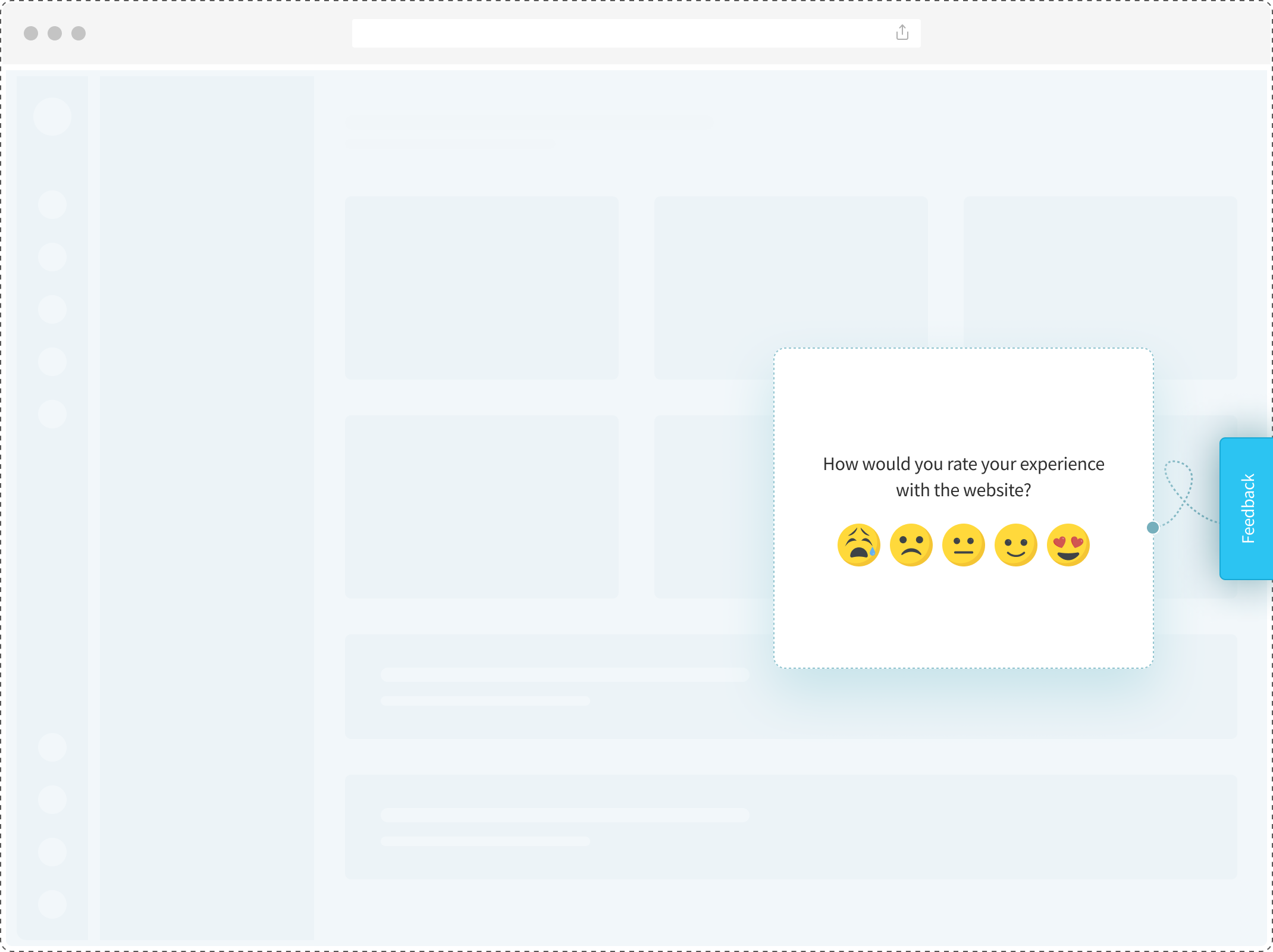
Some popular smiley face survey questions you can use while measuring website experience are below.
-
How would you rate this website?
-
How satisfied are you with the experience on this website?
-
How satisfied are you with the content or information on the website?
-
How was your purchase experience?
-
How would you rate your shopping experience on the website?
2) Email Surveys
Embedded smiley and emojis in email is another great customer feedback collection method to gather to get high response rate and quick feedback from your customers. Email surveys can be triggered at regular intervals, or automated to be sent after transactions or events to measure customer feedback.
Smiley surveys can also be used in email signatures for customer service agents and sales teams to get customer feedback about help, support, and interaction.
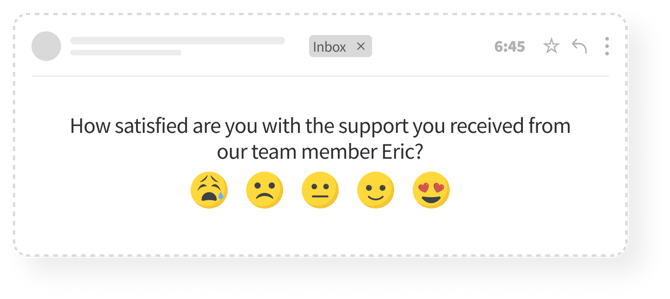
3) On-Premises and Kiosk Surveys
Smiley survey kiosks on survey apps using tablets, iPads and mobile phones can be set up easily at different physical locations to capture feedback from visitors. All the feedback is stored in the app for weeks and syncs automatically once the internet is connected.
Popularly known as smiley terminal surveys, these are great for retail store, healthcare, high volume places like malls, airports, washrooms, facility feedback, even offices and more.
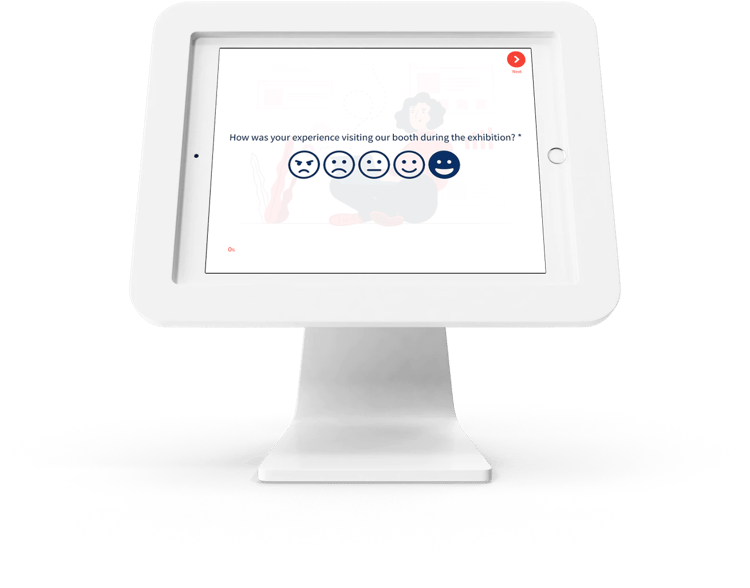
4) In-Product and In-App Feedback
In-product and in-app experience is very crucial and using smiley face surveys makes a lot of sense since they’re very quick and easy for users to answer and useful to collect customer feedback. They also work great as in-app surveys, popup surveys, and emails which are all ideal ways to measure user satisfaction.
Emoji survey questions can be used across lifecycle in products like post free trial, onboarding experience, feature feedback, general satisfaction and so on.
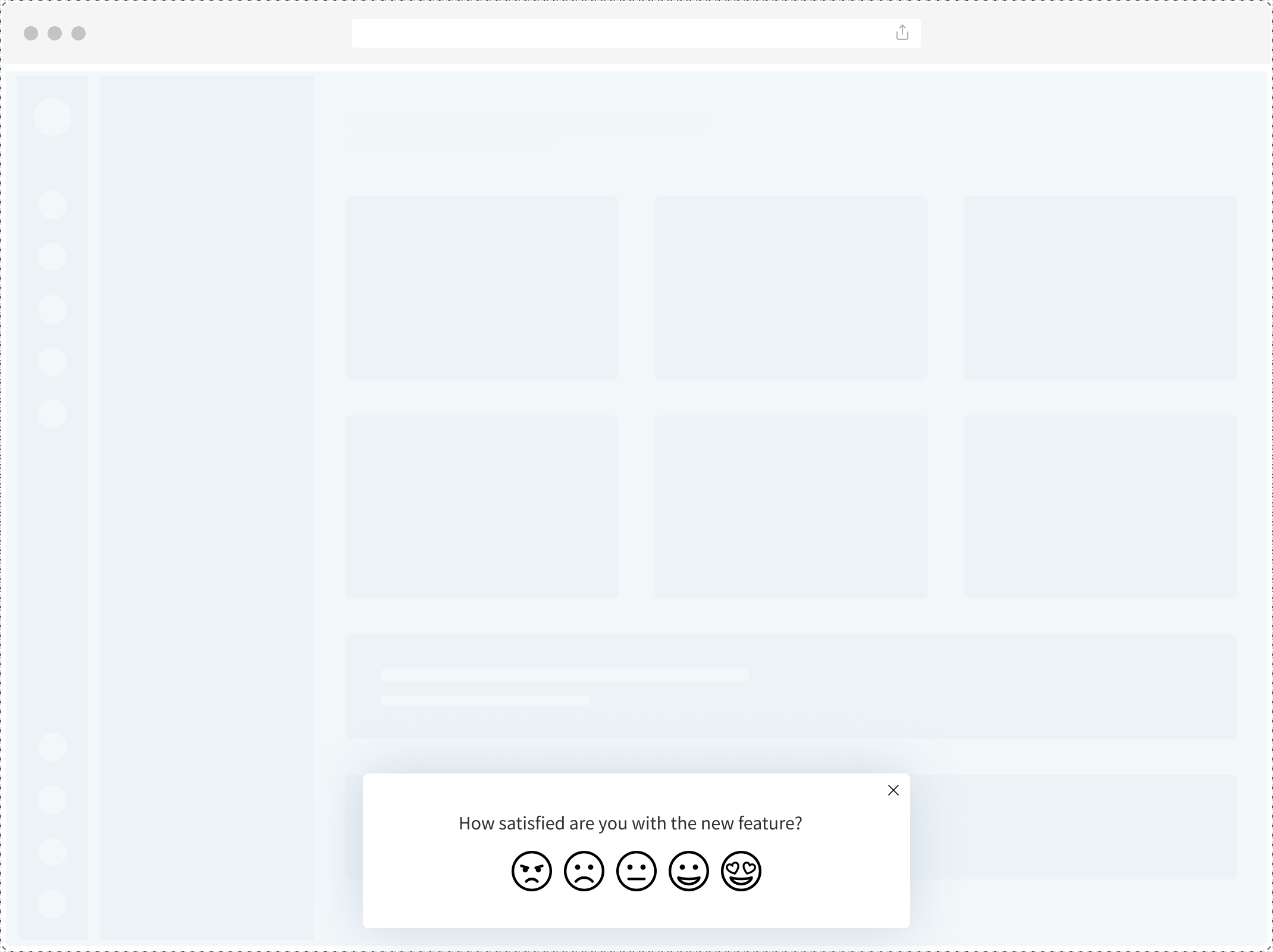
Here are some examples of questions to ask for measuring product experience.
-
How was your free trial?
-
How was your onboarding experience?
-
How would you rate your experience with the product?
-
How satisfied are you with the product?
-
How would you rate the new feature?
Commonly Used Smiley Face Scales
Based on what you’re looking at measuring and where you can use different types of scales for your smiley face survey. Here are some commonly used survey questions based on the smiley scale and format.
1. 2-Point Smiley Face Rating Scale
This is also known as a happy or not Survey. The respondents get two options - happy smiley and sad smiley to choose from.
It’s great for quick surveys and hence has gained popularity, but it lacks in giving a range of emotions to choose from, as experiences are not always easy to fit into just happy or sad brackets. Answers to the 2-point scale would be restricted to yes or no, agree or disagree, which may not be sufficient in most cases.
2. 3-Point Smiley Face Rating Scale
On a 3-point scale, respondents can choose between three smiley faces representing happy, neutral, and sad emotions. This scale is simple and quick to answer and accommodates the moderate feeling or expression.
3. 5-Point Smiley Face Rating Scale
The 5-point scale (in our opinion) is the ideal one to use for measuring customer satisfaction and feedback. It covers a range of emotions and accommodates neutral, extreme, and moderate emotions in the right mix.
Respondents can choose from Very Happy, Happy, Neutral, Sad, or Very Scale emoticons. This scale provides more granularity, allowing respondents to express their emotions or sentiments with more nuance.
4. 7-Point Smiley Face Rating Scale
In a 7-point scale, respondents get the option to choose from Extremely Happy, Very Happy, Happy, Neutral, Sad, Very Sad, or Extremely Sad in the survey question. This scale offers even more differentiation and sensitivity to variations in emotions or opinions.
However, having as many options may be confusing for the respondents, as well as yield results that may not be effective for businesses.
5. Likert Scale with Smiley Face Feedback Rating Scale
Combining a Likert scale (e.g., strongly agree, agree, neutral, disagree, strongly disagree) with smiley faces to visually represent the response options. For example, a happy face might correspond to "strongly agree" or "agree," while a sad face could represent "disagree" or "strongly disagree."
Using Smiley Face Surveys the Right Way - Questions & Tips
In order to leverage smiley face surveys to collect actionable feedback, it is essential to use them the right way. Here are some tips for this and some question types to use in the survey.
Emoji Survey Questions
There are various ways you can effectively use the Smileys Survey to gauge customer satisfaction. While the smiley question remains, you can modify the rest of your survey based on what you’re measuring, how you’re measuring it and how much time would you like your customers and users to spend on giving you feedback.
In an ideal smiley face survey, we recommend you use the following:
-
CSAT question with Smiley Face: We recommend using the 5-scale smiley face question while collecting feedback. You can ask questions like, How was your experience?, How satisfied are you with the service today?, How would you rate your experience with the product?, and so on. You can also use multiple smiley face questions in the same survey with the same answer options to measure feedback on various parameters.
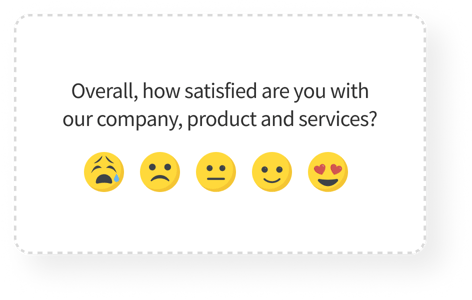
-
Comments or Open-ended questions: The smiley question would tell you the customer sentiment. The reason behind the sentiment can be gauged using open-ended questions like comment boxes. These allow customers to share more about why they chose a particular emoticon in their own words. Customer sentiment analysis can then help identify trends, behavior patterns, and other hidden sentiments.
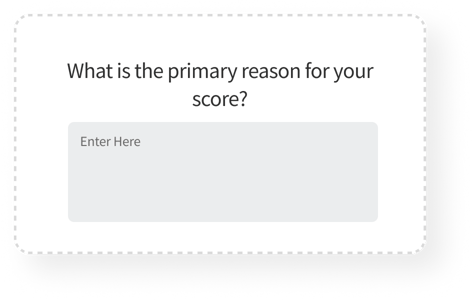
-
Closed-ended questions: Instead or in addition to using comment boxes, you can also use close-ended questions as follow up questions. They help investigate further into customer experience and give you quantitative feedback to work with.
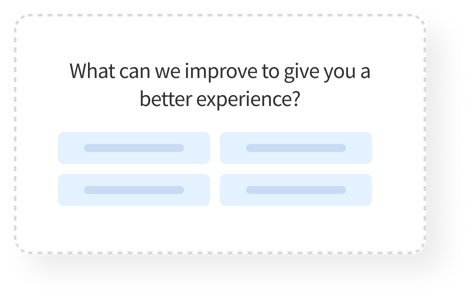
-
Other CX Metrics: To understand more about how your customer feels, you can use other metrics like Net Promoter Score to measure customer loyalty and Customer Effort Score which gives insight into customer's perceived effort.
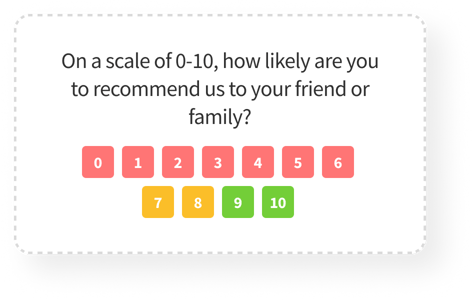
Smiley Surveys Best Practices
While the best practices of creating effective surveys remain the same, like not using double-barreled questions, avoiding leading questions or loaded questions, and keeping surveys simple, there are some specific factors you can look at specific to smiley face surveys to make them more effective.
1. Using a suitable rating scale
A good rating scale should include a range of emotions and possible sentiments. Hence, we recommend using the 5-point smiley scale as it reflects a good range of emotions and at the same time, is not overly confusing for the customers.

2. Balance out negative and positive emotions
Smiley surveys like all rating scales should be balanced. If you're including happy and sad emoji, you must also include a neutral smiley face option to indicate moderate emotion. If you’re introducing any extreme emoticon, it should be on both ends like very happy and very sad or angry.
The scale should be easy to understand, non-confusing and very clear. All options must indicate only a single emotion so it is easier for customers to answer and express their sentiment.
 3. Using the right design
3. Using the right design
Like smiley face surveys, but think they might look childish and may not suit your brand? There are two styles of smiley surveys you can choose from - Emojis and Outline. The Emojis are yellow in color, very similar to what we use in our lives while using instant messaging. The outline Smiley Faces are the same expressions but just outlines and look more sophisticated.
The outline style can also match well with your brand colors and carries all the benefits of the Smiley Surveys.
Some companies, especially in healthcare, tend to choose this style over emojis to ensure that the surveys look somber.
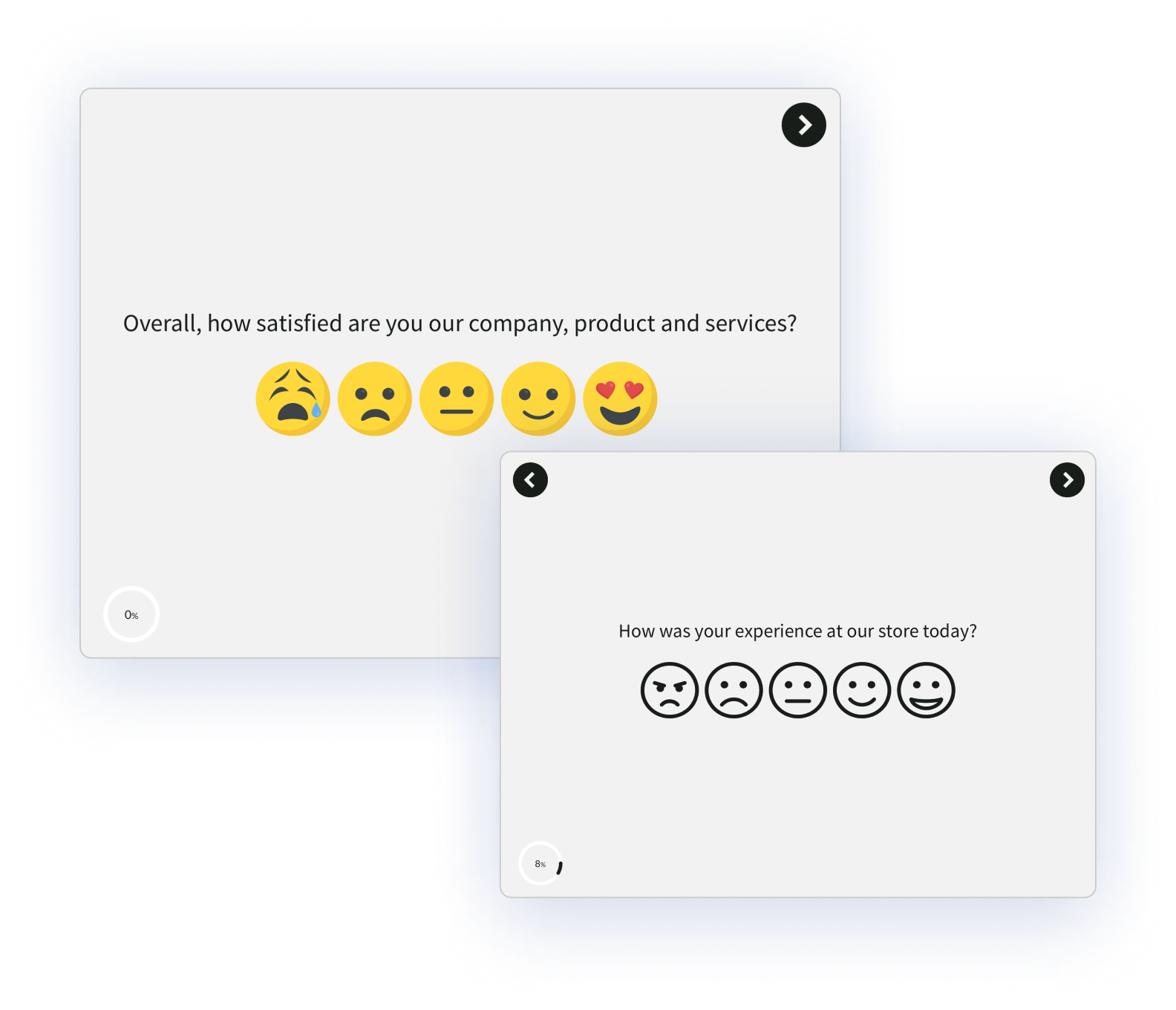
4. Setting Action to Close the Loop
Just setting up surveys and getting responses is not enough. It is also important to take action to close the loop and make customers happy. There are a few simple ways you can ensure that all feedback data is analyzed and addressed.
- Set up automated alerts - Bad experience? Inform your team and key stakeholders immediately with automated email and sms alerts for incoming responses.
- Set up automated replies - Don’t leave users and customers hanging. Preset replies that automatically trigger to acknowledge the response. Ideally, use these automated replies to also convey expected time of resolution or next steps to customers.
- Create tasks to enable action - What action needs to be taken to resolve issues can be determined next. This can either set up through automated workflows or manually driven. The right steps can be assigned to the concerned team members to activate action.
- Organize survey responses with automation - Incoming feedback can be organized with tags and themes using automation. This helps in better analysis and reporting.
- Follow up and close the loop - Once action is determined and taken, you can follow up with customers (again using smiley face survey) to gauge their satisfaction with the resolution and close the feedback loop.
Ready to get started with Smiley Surveys?
As smiley face surveys are easy to use, universally understood, and quick to respond, they can fetch meaningful customer insights and feedback at each customer journey touchpoint. We recommend using a survey software that can help you create and share smiley surveys easily, collect feedback, take action, respond to customers, and close the feedback loop to enhance customer satisfaction.
Schedule a demo to start using smiley face surveys. Check out the smiley face survey template and start collecting customer satisfaction quickly.
